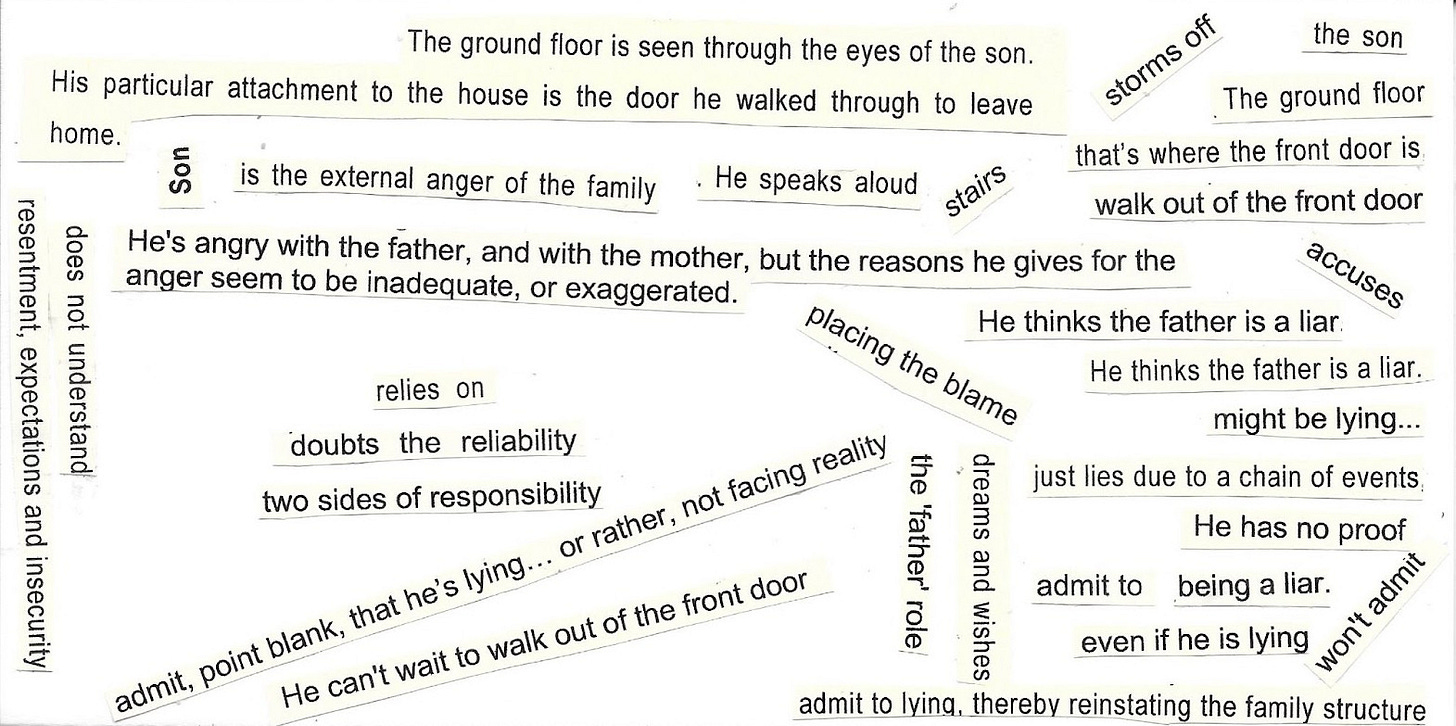A musical called four is the work of theoretical theatre* I’m currently sharing. Click here for the start of the story.
Here is the son.
(He doesn’t have to be the son. He doesn’t have to be a ‘he’. In that sense, imagine the character any way it works for you.)
He’s angry. He’s carrying the anger in the family, all coiled up and repressed. Constriction, unexpressed.
There’s a storm brewing, outside and in, inside and out, threatening to turn him inside out as the house turns inside out and empties out.
Now I’ll make it be winter. Perhaps it threatens snow. And who moves house in winter? No-one I know. It’s not the time to pull up roots and go.
Winter is the oldest of the seasons, by far. (Or so says Bachelard.)
And anger, I say, is the oldest of turning points… Well, it’s one of a pair: here is anger, and there, relief.
When I talk in abstract terms about writing characters, I propose that there are only two motivating forces: fear, and hunger. They sit on opposing sides of a spectrum, and every action taken by every character is motivated by the drive to address an imbalance between the two.
Instead of ‘fear’ and ‘hunger’, I might less poetically describe a desire for avoidance, or for acquisition.
This globe-shaped spectrum is further described by directional response, which I like to view as an imbalance between anger and relief. Or less poetically, between assertion and acceptance.
So I have this spectrum globe:
fear ← anger — relief → hunger
avoidance ← assertion — acceptance → acquisition
The son fears that his father is lying, and his directional response to that fear is anger. He’s hungry for the father to admit to lying, which will bring relief by reinstating reliability.
I see him suspended in this globe-shaped spectrum right there, at a precise intersection of fear and anger, of hunger and relief.
Everyone tells both stories and lies, which are not the same thing. Maybe in this house, the mother is the keeper of the stories and the father, the teller of the lies.
(Interesting, that I see her as holding the stories, and him as giving the lies. Keeping, holding, bearing, knowing. Telling, giving, sharing, bestowing.)
In this model of directional response, anger is a turning point. Usually, at an assertive turning point, a character takes action, and the action for the son in my notes is to walk out. Storm off.
Except there’s a storm outside.
My notes say he can’t articulate why he’s angry in any reasonable way. Well, who can? It’s always unreasonable to assert anger…
… because anger is the oldest emotion, and requires no reason. Mythologically, it is the provoking of Amygdala and Hypothalamus, her almond eyes narrowed, blood pounding through his veins. Anger exists across species. It is primal.
The more ancient roots of the word ‘anger’ relate not to outward aggression but rather, to internal tightness.
Constriction, unexpressed.
My notes say: he can’t wait to walk out of the front door, and they also say: that is the door he walked through to leave home. Time and space are all gathered together here, so perhaps he has left, and leaves, and will leave, all at once.
Structure… In theory, and from any role or any point of view, what kind of door or portal does it seem to be, to you?
There is more to the son, but that will come later.
Click here to read the previous post: mother
Click here to read the next post: father
*This may be theoretical theatre, but it’s still protected by Copyright © 2000-2025 by Jenifer Toksvig All Rights Reserved. Though I may be inspired by conversation and ideas, as long as you don’t infringe my copyright, anything you write in response to this belongs to you. Obviously. The Poetics of Space by Gaston Bachelard is translated into English by Maria Jolas, quoted here where referenced for the purposes of researching this work.






Before my father lost his license to practice medicine he used to take me to see the bodies of murder victims. My mother tried to stab me once when she was drunk but I knocked her out with a whisky bottle. To keep me from testifying against them they had me declared psychotic and locked up in a mental institution. So there is a lot of fear and anger there.